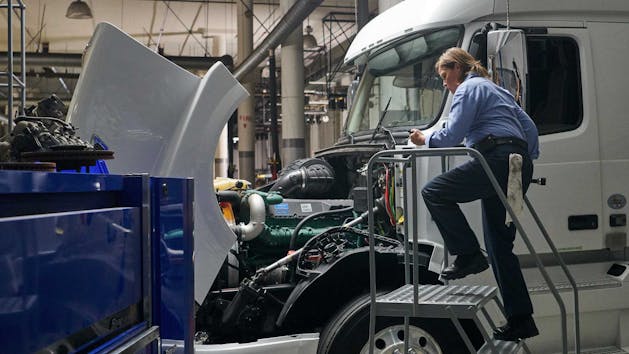Find the right solution for your business with our free Fleet Management Buyer’s Guide.
The Top 4 Reasons for Roadside Breakdowns
No one likes being stuck on the side of the road. If you're a driver with a tight schedule, waiting for roadside assistance is something you can't afford to do. For fleet owners and operators, a stranded driver can mean unexpected expenses, missed stops and frustrated customers.
But breakdowns do happen, and here are the top four reasons why:
1. Tires
Tires cause more than 50 percent of roadside breakdowns, according to Jon Morrison, president of WABCO Holdings' Americas Business Unit.
However, most of those breakdowns are preventable, according to data from the Federal Motor Carrier Safety Administration. Only 15 percent of tire failures result from sudden damage, while the rest stem from slow leaks.
To help prevent roadside breakdowns and extend the life of your tires, they should be properly inflated. Tires that are 10 percent underinflated cause tread life to decrease by 9-16 percent, according to Goodyear.
2. Batteries
Battery failure is one of the most common incidents requiring emergency roadside assistance. However, most Americans have never had their battery tested before their vehicle failed to start.
Battery terminals should be inspected for corrosion whenever a vehicle is being serviced, and batteries should be checked annually after they have been in use for three years.
3. Keys
You may feel embarrassed if it happens to you, but a key locked inside the vehicle is still one of the most common reasons people call for roadside assistance.
To prevent this mishap, Consumer Reports recommends keeping a spare key on your person, with someone who can rescue you or hiding a magnetic key case underneath the vehicle.
4. Mechanical failure
Many roadside breakdowns occur because of minor problems, but each year a significant percentage of calls for roadside assistance are due to potentially dangerous mechanical issues related to the engine, transmission or brakes.
Networkfleet helps fleet managers identify mechanical issues by providing extensive engine diagnostics. Engine diagnostics can assist managers in reducing costs associated with downtime, repairs and strong>wear and tear.
You can also receive automatic alerts when one of your vehicles suffers a transmission malfunction or engine problem. This can help you identify and address issues before they become critical and coordinate repairs when a system fails.
Want to help protect your drivers?
Preventive maintenance can help you reduce the risk of roadside mechanical breakdowns. Networkfleet helps streamline maintenance with features that offer:
- Proactive reminders for regular maintenance.
- Instant access to the complete maintenance and repair history of every vehicle in your fleet.
- GPS tracking so you know the speed, location and engine performance of fleet vehicles.
This allows you to keep maintenance schedules on track, better predict maintenance costs and make smart decisions about when to replace aging vehicles.
Even the best preventive maintenance program won't stop every roadside breakdown. That's why Networkfleet protects every equipped vehicle with emergency roadside assistance at no extra charge.
Our Emergency Roadside Assistance Plan offers services for these common roadside problems:
- Tires. Tire change with the vehicle's spare.
- Battery. Jump start a dead battery and/or perform minor mechanical adjustments.
- Keys. Locked-out drivers can gain access to their vehicle.
- Mechanical. Towing up to 25 miles to the nearest service provider or driver-specified location.
- Fuel. Deliver up to 3 gallons of fuel.
- Winch service. Extracting stuck vehicles, up to 100 feet off the road.
Networkfleet can help your drivers with maintenance alerts, roadside assistance and more.
Find out more about Networkfleet maintenance alerts, and roadside assistance, on our features page.
Find out how our platform gives you the visibility you need to get more done.




